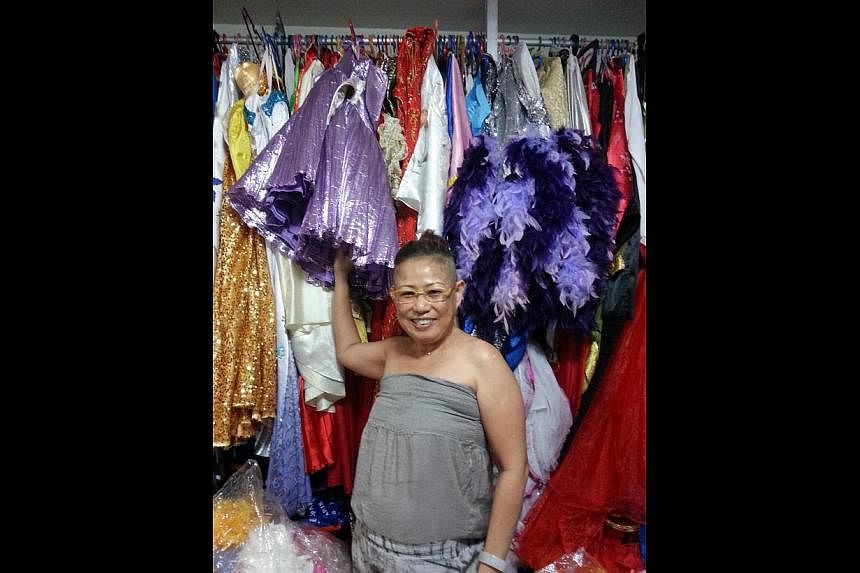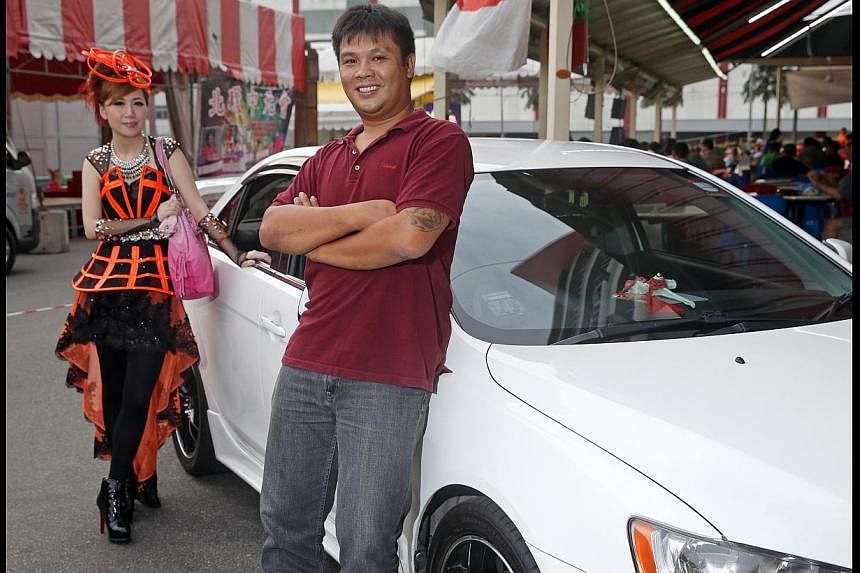The flamboyant singers and witty hosts get all the attention at getai shows, but those who work behind the scenes are crucial to the smooth running of these concerts during the Hungry Ghost Festival, which runs from July 27 to Aug 24 this year.
SundayLife! speaks to Mr Alan Tan, who shuttles getai singer Yuan Jin to and from her shows; Ms Susan Lim, a choreographer and costume-maker for the flashy back-up dancers; and veteran band Venus, who have been backing getai shows for 25 years.
Follow Yip Wai Yee on Twitter @STyipwaiyee
Backing band have memorised 1,000 songs
They do not rehearse, but throw them a song title and five-member backing band Venus can likely play it right off the bat.
From Teresa Teng classics to Hokkien drama soundtracks to English pop songs such as Maroon 5's Moves Like Jagger, the group have memorised a wide repertoire of more than 1,000 songs.
This is handy given how haphazard things can be in the getai scene, where the popular band have been booked to play 23 out of the 29 nights of the Hungry Ghost Month this year.
Says their drummer Melvin Tan, 40: "We get the song list from the singers only just before they go on stage. It helps if we know the songs and can play them. That's why we must keep learning new songs."
If they do not know the song, the band will sight-read the music scores provided by the singers. Tan adds: "You know lah, in getai, we always have to be flexible."
Getai bands are hired to play for all the performers for the entire show, which runs from about 7 to 10.30pm.
Singers arrive shortly before they are scheduled to sing, scribble a few song titles on a piece of paper and pass it to the band.
Says Mr Tan: "People think doing getai is easy because these are just free concerts. But it's difficult for bands because we don't know what songs we'll have to play. And since we don't rehearse with the singers, it's hard to predict what the interaction with them will be like. We have to stay very alert at all times."
The band members have full-time work in the day. Tan works in sales, while his bandmates Clarence Chew, the 46-year-old bassist, is an engineer; guitarist Danny Pea, 51, is a truck driver; keyboardist Randy Ong, 47, owns a car accessories shop; and backing vocalist Lan Huishan, 31, works as a musician and voice-over artist.
The band's secret to keeping up energy levels through the long nights is "two cups of kopi-O kosong each", says Tan, with a laugh. "We also have tons of fun so we don't really feel tired."
The band have been playing together for 25 years, from the time the four men in the group became friends at a travelling fair where Tan's father managed a beer garden.
Sole female member Lan joined the band in 2009, which Tan says "has been great for the band because it sets us apart from other bands."
He adds: "Usually, getai bands don't have backing vocalists, so having Huishan on board is a bonus. We always try to be innovative and keep things fresh as a band."
That also means becoming more high-tech, which includes going paper- less. "We used to take books of music scores with us to the stage, but it got really heavy. As times changed, we transferred them onto iPads instead, where we have saved more than 5,000 scores."
Backing bands are paid about $2,500 a night, which covers the members' performance fees as well as the rental of musical instruments and equipment.
Outside of the Hungry Ghost Month, the band are hired to back stars at ticketed concerts here, such as for Taiwan singers Tsai Hsiao-hu and Daniel Luo Shi-fung, as well as play at private functions.
But there is something about playing at getai shows that the group hold dear.
Tan says: "Getai show audiences shout and show their appreciation very freely and naturally, and the easy atmosphere makes the concerts feel very cosy. Every time we play at a getai show, we feel like we're at home."
Please get me to the stage on time
It is unacceptable for getai singers to be late for their shows as it is a huge superstitious no-no for getai shows to stop midway.
That is why designated drivers such as Mr Alan Tan, 37, are so important in ensuring that the singers get to the venues on time.
Considering that getai singers typically perform at three to five different venues spread across the island on a single night, standing around waiting for a cab to come by is risky.
This year, Mr Tan has been tasked to chauffeur Shanghai-born singer Yuan Jin to all her shows on all 29 nights of the Hungry Ghost Month. He is doing it as a favour to his childhood friend and Yuan's husband, getai show organiser Aaron Tan.
"We've known each other for so long, so of course, I'll do this for him. Most getai drivers are like me - they do it as a favour to the singer's friends or relatives.
"Otherwise, how will these singers get to the venues on time? It's not easy to move around if they have many costumes or music scores to carry," he adds.
He started shuttling getai singers only last year, again as favours for friends. "I drove singers Qi Xian and Zhu Lili last year, both of whom are also my long-time buddies."
Mr Tan, who is married with four kids and runs an incense paper business in the day, is paid a token $30 for each venue he takes the singer to.
Usually, he receives the show schedule only the night before.
He will then calculate the distance between the venues and the best routes to take. If he thinks the schedule is too tight, he will inform the singer, who will then try to arrange more suitable performance times with the getai organisers.
He also ensures that the petrol tank of his car is full before the evening begins. His own bladder, however, is kept empty.
"When night comes, I feel the most nervous because I'm very worried that I'll have to pee between trips. At some show venues, there are no proper toilet facilities and I would not have time to go and hunt for them," he says, adding that he does not drink much water after 6pm.
"Over the whole Hungry Ghost month, I also try not to eat very spicy food because I don't want to risk falling ill. That would be very inconvenient for the singers, should anything stop me from doing this job properly."
He recounts a recent incident when he felt especially "anxious" when Yuan Jin was asked by an audience member to sing one more song than planned.
He says: "She was supposed to sing three songs but someone in the audience demanded that she sing an extra Hokkien song, which she did.
"I immediately grabbed all her music scores and bags from backstage, got to the car and started the engine, and was on standby for her to get off the stage. Luckily, we made it to the next venue with five minutes to spare, but we were cutting it really close."
He adds that such incidents rarely happen. "Audiences do not realise that the singers have to rush off to other places. They just want them to sing their favourite songs, which the singers occasionally accommodate to keep them happy."
Yuan Jin, 39, praises Mr Tan for being a "conscientious and trustworthy driver".
She adds: "He knows the routes well and reacts quickly to situations, so I trust him to be able to get me to the shows on time.
"He's also a sensitive guy, always helping to carry my bags and getting my scores from backstage, without me even asking. With him taking care of all that, I can just focus on my singing."
Choreographer and costume maker rolled into one
Evening falls and Ms Susan Lim leaves home with four suitcases packed to the brim with at least 12 sets of costumes for six dancers.
It is almost a nightly ritual for the 54-year-old.
She choreographs moves for getai back-up dancers and also sews costumes for them and lugs them to the show venue on her own.
"Every time I hail a cab with all these suitcases, the driver will ask if I'm moving house or something," she says with a laugh in Mandarin.
"There are so many costumes to take to the venue but I'm glad to do it because I want the dancers to look good. I want to give them as many options as possible."
Scattered all over her three-room HDB flat in Queenstown, are thousands of costumes and props that she has created over the past 15 years.
Ms Lim, who spends more than $5,000 a year on costumes and accessories, says: "I can get a little obsessive about making new costumes. As soon as I wake up, I flip through magazines to look for ideas and inspiration."
The self-taught tailor, who sews the pieces on her machine at home, adds: "Of course, I can get professionals to make these costumes but it would be very expensive."
She is the head and choreographer of an informal dance crew fondly known as the Susan Lim Dancers, which is made up of about 40 freelance male and female dancers.
They are back-up dancers at private functions and other events and perform at getai events at least four nights a week during the Hungry Ghost Month.
Back-up dancers are typically paid about $200 to $300 each for one show, and there are about six to eight dancers at each show.
Audiences generally assume that it is easy being a getai back-up dancer. Getai concerts are free, after all, and people think the audiences are undemanding.
But Ms Lim says the job requires a quick mind.
"We know what songs the getai singers will be performing only shortly before they begin, so back-up dancers must work quickly and adapt to the situation," she says, adding that the dancers do not rehearse with the singers.
Depending on the tempo and rhythm of the song, Ms Lim will instruct her dancers on which choreographed sequence to perform onstage.
She has taught them at least 30 different sequences, which can be used for a wide variety of songs.
Never mind that the dancers' outfits often do not match that of the singer's.
She says: "We cannot predict what the singers will wear because that's up to them and we'll find out only when they perform.
"But I'll try to bring a variety of costumes for the dancers, from the more casual and lightweight ones for the fast disco tunes, to the more elaborate and dramatic ones to go with ballads. We just try our best to make things look as coherent as possible."
Perhaps, for some audience members, simply seeing a bevy of svelte girls and hunky guys grooving in the background is more than adequate.
Ms Lim, who started dancing when she was 18, went fully behind the scenes about eight years ago.
She finds pleasure in choreographing new moves and fashioning new costumes for her dancers.
She adds: "The dancers and I are like one big family. On the nights when we get together for these shows, we chat and laugh in between the songs, which makes the shows feel like casual gatherings rather than real work."




